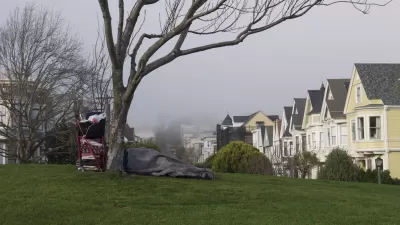Two primary strategies will help to achieve affordable living: Reduce household transportation costs and support smaller living spaces.

Housing is too expensive in some of America's major metropolitan areas, and something must be done about it. However, it would be a tragic mistake to focus only on the cost of rent, or the sales prices of homes. As we work to bring down housing costs, we also need to make affordable options available in other aspects of people's lives which can offset high rent. There are two primary areas that we should focus on in order to promote affordable living:
1. Reduce household transportation costs
Unaffordable housing is a serious problem, but the combined cost of housing and transportation is what really matters. In regions with affordability problems, housing and transportation costs tend to be inversely related. As housing gets cheaper toward the metropolitan fringe, transportation costs increase, often erasing the benefit of the lower-cost housing. For example, someone living in New York's Greenwich Village will undoubtably pay exorbitant rent, but due to the neighborhood's high walkability, abundance of amenities, and excellent transit access, their transportation costs can be nearly zero. If the same person moves out to suburban New Jersey they can get a cheaper house, but their transportation costs will skyrocket.
2. Support smaller living spaces
The average American home has been getting bigger (and bigger, and bigger) for a long time. In the 1950s the average home was only 980 square feet, but by the 2000s it was 2,300 square feet, despite the fact that the average household has fewer people now. There are a lot of perks to living in a large house, but there are also some downsides. Big homes take up more space, cost more to build, cost more to heat and cool, and cost more to furnish and equip. Inordinately large home can create serious financial strain for some households, especially in areas where rent and mortgage costs are exceptionally high.
FULL STORY: Do we need affordable housing or affordable living?

Maui's Vacation Rental Debate Turns Ugly
Verbal attacks, misinformation campaigns and fistfights plague a high-stakes debate to convert thousands of vacation rentals into long-term housing.

Planetizen Federal Action Tracker
A weekly monitor of how Trump’s orders and actions are impacting planners and planning in America.

In Urban Planning, AI Prompting Could be the New Design Thinking
Creativity has long been key to great urban design. What if we see AI as our new creative partner?

Massachusetts Budget Helps Close MBTA Budget Gap
The budget signed by Gov. Maura Healey includes $470 million in MBTA funding for the next fiscal year.

Milwaukee Launches Vision Zero Plan
Seven years after the city signed its Complete Streets Policy, the city is doubling down on its efforts to eliminate traffic deaths.

Portland Raises Parking Fees to Pay for Street Maintenance
The city is struggling to bridge a massive budget gap at the Bureau of Transportation, which largely depleted its reserves during the Civd-19 pandemic.
Urban Design for Planners 1: Software Tools
This six-course series explores essential urban design concepts using open source software and equips planners with the tools they need to participate fully in the urban design process.
Planning for Universal Design
Learn the tools for implementing Universal Design in planning regulations.
Gallatin County Department of Planning & Community Development
Heyer Gruel & Associates PA
JM Goldson LLC
City of Camden Redevelopment Agency
City of Astoria
Transportation Research & Education Center (TREC) at Portland State University
Jefferson Parish Government
Camden Redevelopment Agency
City of Claremont


























